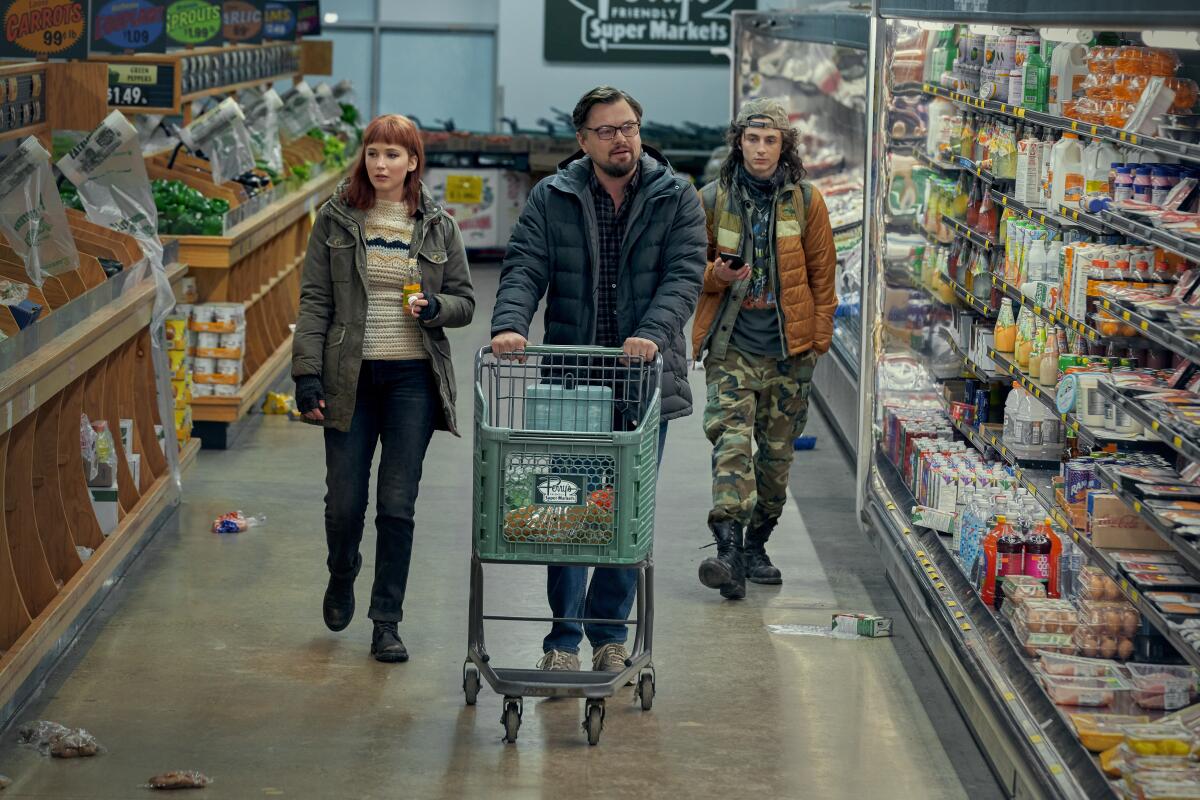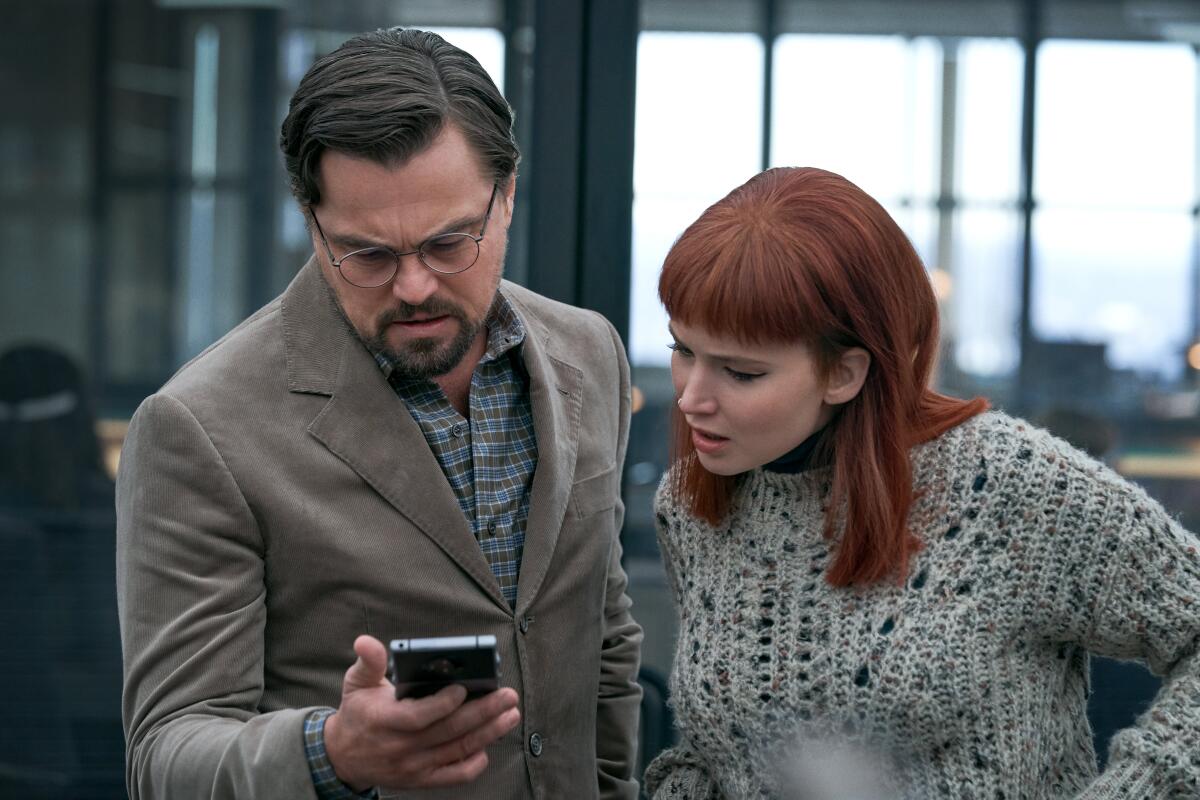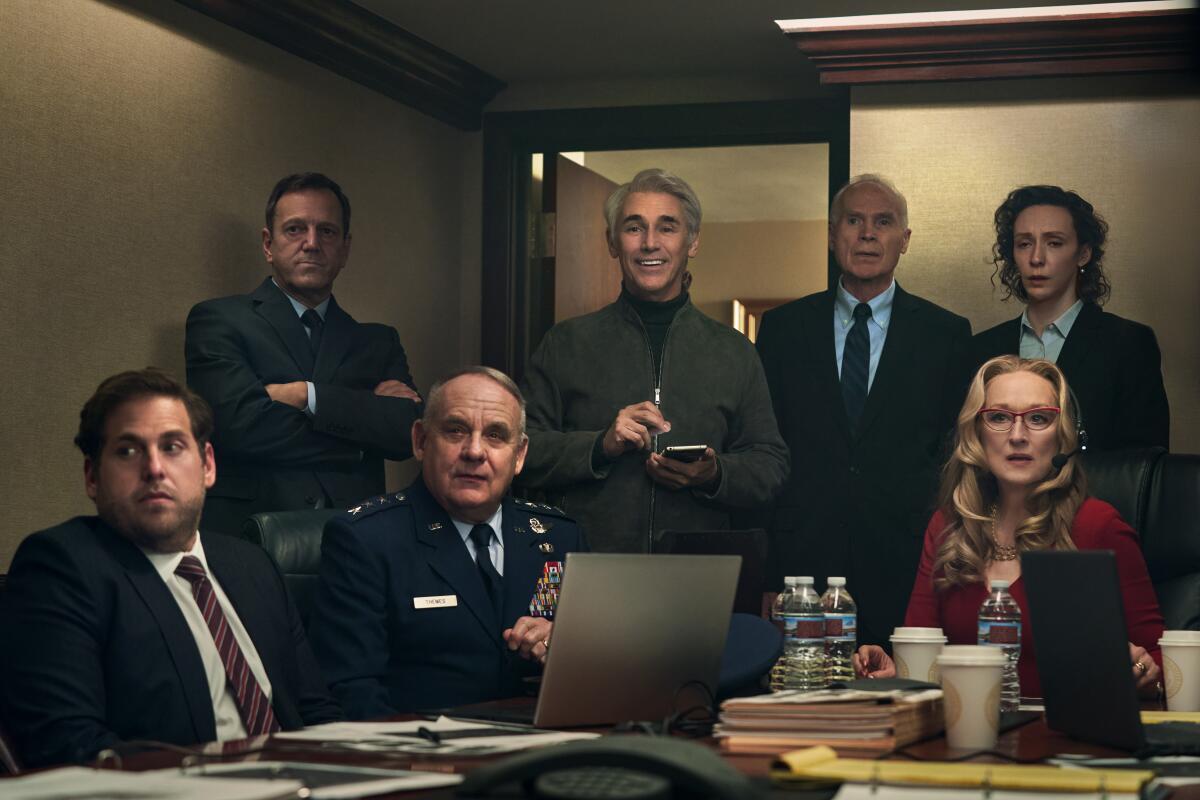How Adam McKay ended ‘Don’t Look Up’ with a bang

- Share via
Warning: The following story contains plot spoilers for “Don’t Look Up,” including the ending. If you haven’t yet seen the film, we suggest reading the review and this joint interview with director Adam McKay and stars Leonardo DiCaprio and Jennifer Lawrence instead. And then come back when you’ve seen it.
Adam McKay knows full well how the big Hollywood movie about the impending global cataclysm is typically supposed to go.
Bruce Willis blows up the asteroid. The Avengers beat back the alien invasion. Superman flies around the world fast enough to turn back time. Everyone leaves the theater cheering, reassured that life will go on.
That is exactly what McKay didn’t want to do with his star-studded film “Don’t Look Up,” which arrives on Netflix Friday.
A warning about the climate crisis wrapped in the guise of a movie about an impending comet impact, “Don’t Look Up” ends with the worst case scenario coming to fruition: World leaders don’t rise to the occasion. Technology doesn’t save the day. The comet slams into the planet and wipes out every living thing. Even the handful of privileged, wealthy people who manage to escape to another planet are immediately gobbled up by alien creatures.
Did we mention it’s a comedy?
In denying the audience that usual feel-good conclusion, McKay — inspired by dark comedies like “Dr. Strangelove” — hoped to deliver a wake-up call to those who would happily keep hitting the snooze button when it comes to addressing the real threat of climate change.
“We’ve seen hundreds of movies where the world is about to end, whether it’s Marvel movies or James Bond or the ’70s disaster movies, and it always works out,” McKay told The Times recently. “I think it’s not crazy to say that maybe that’s part of the reason we’re not taking the collapse of the livable atmosphere seriously. Elon Musk was asked about climate change and basically said, ‘I know that technology will take care of it.’ That sounds like someone who’s seen a lot of movies where you know that in the third act it’s going to work out. … For people to see a movie that ends where people don’t work to get the happy ending — hopefully some people will have a reaction to that.”

Leonardo DiCaprio and Jennifer Lawrence, who play a pair of obscure astronomers who discover the comet and struggle to get the world to take the threat seriously, were drawn to the project not just by the sharp-edged comedy but by the very bleakness of the ending.
“The end of this movie gets really dark, and had it not had that tonal shift, I don’t think we would have been as excited as we were to do it,” said DiCaprio, who has been working to raise alarms about climate change for years. “You can never tell what a movie is going to do culturally, but the end of this film is really a smack in the face.”
”I’m sure I can say this on behalf of pretty much everybody: It’s extremely frustrating to be a citizen that believes in climate change and is scared, but I’m not a part of it — you know, I can’t buy a senator — so we’re just kind of helpless,” said Lawrence. “And finally, this [project] came along and it was just funny and urgent.”
The film was in production as the coronavirus pandemic was raging, giving McKay and his cast a real-time case study of society’s chaotic and polarized response to a global crisis — and confirming the film was on the right track in predicting that such a response might not end so well.
“It was already a crazy script but I would say reality out-crazied us by like 10 to 15%,” McKay said. “Well done, reality.”
In the early days of the pandemic, McKay actually drew a measure of hope from the collective spirit of the initial lockdown that perhaps the world could rally together with similar resolve to address the climate crisis.
“The scientific community has been trying to make this connection about how all of our actions are going to affect everybody — and then here you have this once-in-a-century virus, and everyone is staying home,” McKay says. “You constantly hear the practicalities of why you can’t stop the fossil fuel economy but boy did we make a lot of change awfully fast when it came to COVID. Eventually a lot of it fell apart but I thought it was a good sign that when we’re properly scared, some big old change can come our way.”

As McKay sees it — and as “Don’t Look Up” mercilessly satirizes — the biggest obstacle to that change is our inability in the 21st century media ecosystem to communicate with one another effectively about serious matters, even, or perhaps especially, when the fate of the world hangs in the balance.
“The central conceit [of the film] is that we’ve screwed up the way we talk to each other by profitizing even the most casual of exchanges,” he said. “Whether it’s Snapchat or TikTok or social media or the news, you have to get ratings, you have to get clicks. This isn’t blaming any people or saying anyone’s evil. It’s the system that we’ve created. But we’re in a really dangerous situation because when everything is a sales exchange, you’re never going to hear the dark truth.”
As grim as the prospect of global doom may be, “Don’t Look Up” does end on a note of, if not hopefulness, at least poignancy. In their last moments before the comet hits, DiCaprio’s Dr. Mindy and Lawrence’s Kate Dibiasky gather with friends and loved ones over dinner, taking comfort in one another’s company, sharing mundane gratitudes and making whistling-past-the-apocalypse small talk.
“That’s what I loved about the ending, because I felt like that’s ultimately how I would respond,” said DiCpario. “We’re a communal species, and I would want to be around people I love and ignore the impending Armageddon. That dinner table scene is really what clinched it for me.”
Faced with the real imminent end of the world, McKay says he would immediately become a full-time smoker again and seek out the unhealthiest cheese steak he could find. But he hopes he would eventually find his way to a similar kind of grace.
“I had a heart attack about two and a half years ago; fortunately, it was a mild one and there was no damage done, thank God,” he said. “But man, I couldn’t stop smiling for like three days. I was in the best mood you’ve ever seen. I was like, ‘I’m alive!’ And I’ve heard that when people are terminally ill some people have that reaction, that every moment becomes so delicious and precious. I’d be curious to see if some of that would kick in.”
More to Read
Only good movies
Get the Indie Focus newsletter, Mark Olsen's weekly guide to the world of cinema.
You may occasionally receive promotional content from the Los Angeles Times.











